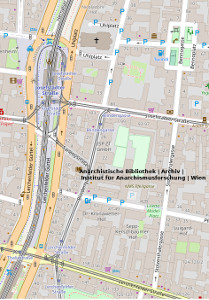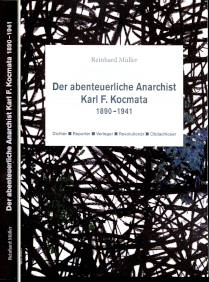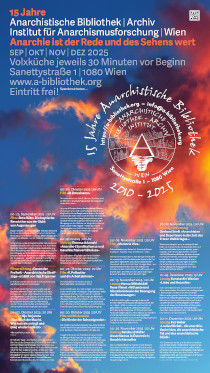 In Letters of Blood and Fire: Work, Machines, and the Crisis of Capitalism
In Letters of Blood and Fire: Work, Machines, and the Crisis of Capitalism
Karl Marx remarked that the only way to write about the origins of capitalism is in the letters of blood and fire used to drive workers from the common lands, forests, and waters in the sixteenth century. In this collection of essays, George Caffentzis argues that the same is true for the annals of twenty-first-century capitalism. Information technology, immaterial production, financialization, and globalization have been trumpeted as inaugurating a new phase of capitalism that puts it beyond its violent origins. Instead of being a period of major social and economic novelty, however, the course of recent decades has been a return to the fire and blood of struggles at the advent of capitalism.
Emphasizing class struggles that have proliferated across the social body of global capitalism, Caffentzis shows how a wide range of conflicts and antagonisms in the labor-capital relation express themselves within and against the work process. These struggles are so central to the dynamic of the system that even the most sophisticated machines cannot liberate capitalism from class struggle and the need for labor. Themes of war and crisis permeate the text and are given singular emphasis, documenting the peculiar way in which capital perpetuates violence and proliferates misery on a world scale. This collection draws upon a careful rereading of Marx’s thought in order to elucidate political concerns of the day. Originally written to contribute to the debates of the anticapitalist movement over the last thirty years, this book makes Caffentzis’s writings readily available as tools for the struggle in this period of transition to a common future.
PM Press – Overview
***********************************************************************************************************
 Creating a Movement with Teeth: A Documentary History of the George Jackson Brigade
Creating a Movement with Teeth: A Documentary History of the George Jackson Brigade
Bursting into existence in the Pacific Northwest in 1975, the George Jackson Brigade claimed 14 pipe bombings against corporate and state targets, as many bank robberies, and the daring rescue of a jailed member. Combining veterans of the prisoners‘ women’s, gay, and black liberation movements, this organization was also ideologically diverse, consisting of both communists and anarchists. Concomitant with the Brigade’s extensive armed work were prolific public communications. In more than a dozen communiqués and a substantial political statement, they sought to explain their intentions to the public while defying the law enforcement agencies that pursued them.
Creating a Movement with Teeth makes available this body of propaganda and mediations on praxis, collecting it in one volume for the first time. In addition, the collection assembles corporate media profiles of the organization’s members and alternative press articles in which partisans thrash out the heated debates sparked in the progressive community by the eruption of an armed group in their midst. Creating a Movement with Teeth illuminates a forgotten chapter of the radical social movements of the 1970s in which diverse interests combined forces in a potent rejection of business as usual in the United States.
PM Press – Overview
***********************************************************************************************************
 Diario De Oaxaca: A Sketchbook Journal of Two Years in Mexico
Diario De Oaxaca: A Sketchbook Journal of Two Years in Mexico
Painting a vivid, personal portrait of social and political upheaval in Oaxaca, Mexico, this unique memoir employs comics, bilingual essays, photos, and sketches to chronicle the events that unfolded around a teachers‘ strike and led to a seven-month siege.
When award-winning cartoonist Peter Kuper and his wife and daughter moved to the beautiful 16th-century colonial town of Oaxaca in 2006, they planned to spend a quiet year or two enjoying a different culture and taking a break from the U.S. political climate under the Bush administration. What they hadn’t counted on was landing in the epicenter of Mexico’s biggest political struggle in recent years. Timely and compelling, this extraordinary firsthand account presents a distinct artistic vision of Oaxacan life, from explorations of the beauty of the environment to graphic portrayals of the fight between strikers and government troops that left more than 20 people dead, including American journalist Brad Will.
PM Press – Overview
***********************************************************************************************************
 William Morris: Romantic to Revolutionary
William Morris: Romantic to Revolutionary
William Morris—the great 19th-century craftsman, designer, poet and writer—remains a monumental figure whose influence resonates powerfully today. As an intellectual (and author of the seminal utopian News From Nowhere), his concern with artistic and human values led him to cross what he called the “river of fire†and become a committed socialist—committed not to some theoretical formula but to the day by day struggle of working women and men in Britain and to the evolution of his ideas about art, about work and about how life should be lived.
Many of his ideas accorded none too well with the reforming tendencies dominant in the labour movement, nor with those of “orthodox†Marxism, which has looked elsewhere for inspiration. Both sides have been inclined to venerate Morris rather than to pay attention to what he said.
Originally written less than a decade before his groundbreaking The Making of the English Working Class, E.P. Thompson brought to this biography his now trademark historical mastery, passion, wit, and essential sympathy. It remains unsurpassed as the definitive work on this remarkable figure, by the major British historian of the 20th century.
PM Press – Overview
***********************************************************************************************************
 Pistoleros!: The Chronicles of Farquhar McHarg – I: 1918
Pistoleros!: The Chronicles of Farquhar McHarg – I: 1918
Barcelona, 1976: Hired gunmen brutally murder a lifelong friend and fellow anarchist, forcing Farquhar McHarg into a race to document an epic history before he too can be silenced. The first volume of his memoirs finds him a Glasgow boy, dropped by chance into Barcelona’s revolutionary underworld at the tail end of the great imperialist war of 1914–1918, recruited by Spanish anarchists to act as a go-between with Britain’s Secret Service Bureau. McHarg tells of a corrupt and brutal Spanish regime, bent on bringing a rebellious working class back under its heel, and the generous and recklessly idealistic men and women who struggled to transform it after rejecting traditional party politics.
Pistoleros! is a thrilling tale of intrigue and romance, and a sweeping inside view of the saboteurs and spies, the capitalists and bold insurrectionaries of Spain’s bloody past.
PM Press – Overview
***********************************************************************************************************
 The CNT in the Spanish Revolution Volume 1
The CNT in the Spanish Revolution Volume 1
The CNT in the Spanish Revolution is the history of one of the most original and audacious, and arguably also the most far-reaching, of all the twentieth-century revolutions. It is the history of the giddy years of political change and hope in 1930s Spain, when the so-called ‘Generation of ’36’, Peirats’ own generation, rose up against the oppressive structures of Spanish society. It is also a history of a revolution that failed, crushed in the jaws of its enemies on both the reformist left and the reactionary right.
José Peirats’ account is effectively the official CNT history of the war, passionate, partisan but, above all, intelligent. Its huge sweeping canvas covers all areas of the anarchist experience–the spontaneous militias, the revolutionary collectives, the moral dilemmas occasioned by the clash of revolutionary ideals and the stark reality of the war effort against Franco and his German Nazi and Italian Fascist allies.
This new edition is carefully indexed in a way that converts the work into a usable tool for historians and makes it much easier for the general reader to dip in with greater purpose and pleasure.
PM Press – Overview
***********************************************************************************************************
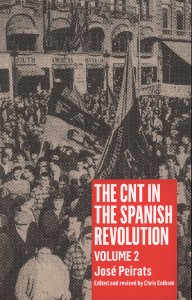 The CNT in the Spanish Revolution Volume 2
The CNT in the Spanish Revolution Volume 2
The CNT in the Spanish Revolution is the history of one of the most original and audacious, and arguably also the most far-reaching, of all the twentieth-century revolutions. It is the history of the giddy years of political change and hope in 1930s Spain, when the so-called ‘Generation of ’36’, Peirats’ own generation, rose up against the oppressive structures of Spanish society. It is also a history of a revolution that failed, crushed in the jaws of its enemies on both the reformist left and the reactionary right.
José Peirats’ account is effectively the official CNT history of the war, passionate, partisan but, above all, intelligent. Its huge sweeping canvas covers all areas of the anarchist experience – the spontaneous militias, the revolutionary collectives, the moral dilemmas occasioned by the clash of revolutionary ideals and the stark reality of the war effort against Franco and his German Nazi and Italian Fascist allies. Volume 2 focuses on the battles raging at both the front and rear guards. Additionally, a biographical chapter, „The Life and Struggles of José Peirats“ gives a great deal of insight into this CNT fighter and historian.
This new edition is carefully indexed in a way that converts the work into a usable tool for historians and makes it much easier for the general reader to dip in with greater purpose and pleasure.
PM Press – Overview
***********************************************************************************************************
 The CNT in the Spanish Revolution Volume 3
The CNT in the Spanish Revolution Volume 3
The CNT in the Spanish Revolution is the history of one of the most original and audacious, and arguably also the most far-reaching, of all the twentieth-century revolutions. It is the history of the giddy years of political change and hope in 1930s Spain, when the so-called ‘Generation of ’36’, Peirats’ own generation, rose up against the oppressive structures of Spanish society. It is also a history of a revolution that failed, crushed in the jaws of its enemies on both the reformist left and the reactionary right.
José Peirats’ account is effectively the official CNT history of the war, passionate, partisan but, above all, intelligent. Its huge sweeping canvas covers all areas of the anarchist experience – the spontaneous militias, the revolutionary collectives, the moral dilemmas occasioned by the clash of revolutionary ideals and the stark reality of the war effort against Franco and his German Nazi and Italian Fascist allies. Volume 3 tells of the CNT’s last push for the anarchist revolution in Spain, and the crushing defeat of the wide ranging activities of the CNT. An additional chapter surveys „The History of Spanish Anarchism in the English Language.“
This new edition is carefully indexed in a way that converts the work into a usable tool for historians and makes it much easier for the general reader to dip in with greater purpose and pleasure.
PM Press – Overview
***********************************************************************************************************
 Arena One: On Anarchist Cinema
Arena One: On Anarchist Cinema
In the wake of the end of the Cold War and worldwide protests against corporate globalization, anarchism continues to attract new adherents among both aging leftists and new generations of young radicals. Arena aims to tap into this revived interest in libertarian ideas, culture and practice by providing a dynamic focal point: a journal that brings together good, stimulating and provocative writing and scholarship on libertarian culture of all kinds.
Designed for a general, intelligent, popular readership as well as for scholars and aficionados working in the area, the first issue of Arena focuses on film and video–historical and modern–and future issues will cover the entire spectrum of the arts: film, theatre, and art criticism as well as political theory and practice, reportage, letters, reviews, and unpublished fiction and nonfiction.
PM Press – Overview
***********************************************************************************************************
 Arena Two: Anarchists in Fiction
Arena Two: Anarchists in Fiction
In the second issue of Arena we aim to provide general insights into the role of the anarchist in fiction, both as protagonist and author.
David Weir’s essay “Anarchist Fiction, Anarchist Sensibilities†focuses on the progenitor of anarchist fiction, William Godwin’s Caleb Williams, published in 1794, that demonstrated the pressing need for the utopian system he described in the first systematic elaboration of anarchist philosophy, Enquiry Concerning Political Justice.
“Epic Pooh†is a newly updated revision of a 1978 article by Michael Moorcock reviewing epic fantasy literature for children, particularly J.R.R. Tolkien’s The Lord of the Rings.
While researching early twentieth-century French anarchist plays translated into Italian, Santo Catanuto discovered interesting information on the literary side of the Communard Louise Michel, indicating that she was the author of Twenty Thousand Leagues Under The Sea.
Stephen Schwartz, a longtime critic of the detective novel, evaluates the arc of French writer Leo Malet from anarchist to arabophobe and in “Between Libel And Hoax,†counters Miguel Mir’s libelous depiction of the Spanish anarchist movement, Entre el roig i el negre.
In his discourse on B. Traven’s The Death Ship, Ernest Larsen looks at the intractable modern problem of identity. Larsen’s short story “Bakunin At The Beach†is about Mr. and Mrs. Bakunin holidaying at Lake Maggiore under the watchful eyes of Inspector Dupin of the Swiss Department of Justice and Police.
Joseph Conrad’s short story “An Anarchist: A Desperate Tale†is republished here from A Set of Six (1908).
“Anarchists in Fiction†is a collection of idiosyncratic reviews of books in which anarchists are portrayed as an eclectic group of villains and criminal degenerates.
Finally, we conclude this second issue of Arena with an article by our cinema editor Richard Porton on Dušan Makavejev’s playful, allusive 1971 film WR: Mysteries of the Organism.
PM Press – Overview
***********************************************************************************************************
 Black Flags and Windmills: Hope, Anarchy, and the Common Ground Collective
Black Flags and Windmills: Hope, Anarchy, and the Common Ground Collective
When both levees and governments failed in New Orleans in the fall of 2005, scott crow headed into the political storm, cofounding a relief effort called the Common Ground Collective. In the absence of local government, FEMA, and the Red Cross, this unusual volunteer organization, based on “solidarity not charity,†built medical clinics, set up food and water distribution, and created community gardens. They also resisted home demolitions, white militias, police brutality, and FEMA incompetence side by side with the people of New Orleans.
crow’s vivid memoir maps the intertwining of his radical experience and ideas with Katrina’s reality, and community efforts to translate ideals into action. It is a story of resisting indifference, rebuilding hope amid collapse, and struggling against the grain. Black Flags and Windmills invites and challenges all of us to learn from our histories, and dream of better worlds. And gives us some of the tools to do so.
PM Press – Overview
***********************************************************************************************************
 Anarchist Pedagogies: Collective Actions, Theories, and Critical Reflections on Education
Anarchist Pedagogies: Collective Actions, Theories, and Critical Reflections on Education
Education is a challenging subject for anarchists. Many are critical about working within a state-run education system that is embedded in hierarchical, standardized, and authoritarian structures. Numerous individuals and collectives envision the creation of counterpublics or alternative educational sites as possible forms of resistance, while other anarchists see themselves as “saboteurs†within the public arena—believing that there is a need to contest dominant forms of power and educational practices from multiple fronts. Of course, if anarchists agree that there are no blueprints for education, the question remains, in what dynamic and creative ways can we construct nonhierarchical, anti-authoritarian, mutual, and voluntary educational spaces?
Contributors to this edited volume engage readers in important and challenging issues in the area of anarchism and education. From Francisco Ferrer’s modern schools in Spain and the Work People’s College in the United States, to contemporary actions in developing “free skools†in the U.K. and Canada, to direct-action education such as learning to work as a “street medic†in the protests against neoliberalism, the contributors illustrate the importance of developing complex connections between educational theories and collective actions. Anarchists, activists, and critical educators should take these educational experiences seriously as they offer invaluable examples for potential teaching and learning environments outside of authoritarian and capitalist structures. Major themes in the volume include: learning from historical anarchist experiments in education, ways that contemporary anarchists create dynamic and situated learning spaces, and finally, critically reflecting on theoretical frameworks and educational practices. Contributors include: David Gabbard, Jeffery Shantz, Isabelle Fremeaux & John Jordan, Abraham P. DeLeon, Elsa Noterman, Andre Pusey, Matthew Weinstein, Alex Khasnabish, and many others.
PM Press – Overview
***********************************************************************************************************
 Anarchism and Education: A Philosophical Perspective
Anarchism and Education: A Philosophical Perspective
While there have been historical accounts of the anarchist school movement, there has been no systematic work on the philosophical underpinnings of anarchist educational ideas–until now.
Anarchism and Education offers a philosophical account of the neglected tradition of anarchist thought on education. Although few anarchist thinkers wrote systematically on education, this analysis is based largely on a reconstruction of the educational thought of anarchist thinkers gleaned from their various ethical, philosophical and popular writings. Primarily drawing on the work of the nineteenth century anarchist theorists such as Bakunin, Kropotkin and Proudhon, the book also covers twentieth century anarchist thinkers such as Noam Chomsky, Paul Goodman, Daniel Guerin and Colin Ward.
This original work will interest philosophers of education and educationalist thinkers as well as those with a general interest in anarchism.
PM Press – Overview
***********************************************************************************************************
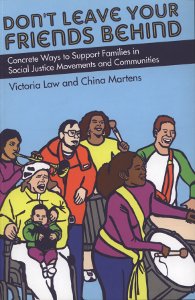 Don’t Leave Your Friends Behind: Concrete Ways to Support Families in Social Justice Movements and Communities
Don’t Leave Your Friends Behind: Concrete Ways to Support Families in Social Justice Movements and Communities
Don’t Leave Your Friends Behind is a collection of concrete tips, suggestions, and narratives on ways that non-parents can support parents, children, and caregivers in their communities, social movements, and collective processes. Don’t Leave Your Friends Behind focuses on issues affecting children and caregivers within the larger framework of social justice, mutual aid, and collective liberation.
How do we create new, nonhierarchical structures of support and mutual aid, and include all ages in the struggle for social justice? There are many books on parenting, but few on being a good community member and a good ally to parents, caregivers, and children as we collectively build a strong all-ages culture of resistance. Any group of parents will tell you how hard their struggles are and how they are left out, but no book focuses on how allies can address issues of caretakers’ and children’s oppression. Many well-intentioned childless activists don’t interact with young people on a regular basis and don’t know how. Don’t Leave Your Friends Behind provides them with the resources and support to get started.
Contributors include: The Bay Area Childcare Collective, Ramsey Beyer, Rozalinda Borcilă, Mariah Boone, Marianne Bullock, Lindsey Campbell, Briana Cavanaugh, CRAP! Collective, a de la maza pérez tamayo, Ingrid DeLeon, Clayton Dewey, David Gilbert, A.S. Givens, Jason Gonzales, Tiny (aka Lisa Gray-Garcia), Jessica Hoffman, Heather Jackson, Rahula Janowski, Sine Hwang Jensen, Agnes Johnson, Simon Knaphus, Victoria Law, London Pro-Feminist Men’s Group, Amariah Love, Oluko Lumumba, mama raccoon, Mamas of Color Rising/Young Women United, China Martens, Noemi Martinez, Kathleen McIntyre, Stacey Milbern, Jessica Mills, Tomas Moniz, Coleen Murphy, Maegan ‘la Mamita Mala’ Ortiz, Traci Picard, Amanda Rich, Fabiola Sandoval, Cynthia Ann Schemmer, Mikaela Shafer, Mustafa Shakur, Kate Shapiro, Jennifer Silverman, Harriet Moon Smith, Mariahadessa Ekere Tallie, Darran White Tilghman, Jessica Trimbath, Max Ventura, and Mari Villaluna.
PM Press – Overview
***********************************************************************************************************
 The Primal Screamer
The Primal Screamer
A Gothic Horror novel about severe mental distress and punk rock. The novel is written in the form of a diary kept by a psychiatrist, Dr. Rodney H. Dweller, concerning his patient, Nathaniel Snoxell, brought to him in 1979 because of several attempted suicides. Snoxell gets involved in the nascent UK anarcho-punk scene, recording EPs and playing gigs in squatted Anarchy Centers. In 1985, the good doctor himself “goes insane†and disappears.
This semi-autobiographical novel from Rudimentary Peni singer, guitarist, lyricist, and illustrator Nick Blinko, plunges into the worlds of madness, suicide, and anarchist punk. Lovecraft meets Crass in the squats and psychiatric institutions of early ‘80s England. This new edition collects Blinko’s long sought after artwork from the three previous incarnations.
PM Press – Overview
***********************************************************************************************************
 Demanding the Impossible: A History of Anarchism
Demanding the Impossible: A History of Anarchism
Navigating the broad „river of anarchy,“ from Taoism to Situationism, from Ranters to Punk rockers, from individualists to communists, from anarcho-syndicalists to anarcha-feminists, Demanding the Impossible is an authoritative and lively study of a widely misunderstood subject. It explores the key anarchist concepts of society and the state, freedom and equality, authority and power, and investigates the successes and failure of the anarchist movements throughout the world. While remaining sympathetic to anarchism, it presents a balanced and critical account. It covers not only the classic anarchist thinkers, such as Godwin, Proudhon, Bakunin, Kropotkin, Reclus and Emma Goldman, but also other libertarian figures, such as Nietzsche, Camus, Gandhi, Foucault and Chomsky. No other book on anarchism covers so much so incisively.
In this updated edition, a new epilogue examines the most recent developments, including „post-anarchism“ and „anarcho-primitivism“ as well as the anarchist contribution to the peace, green and Global Justice movements.
Demanding the Impossible is essential reading for anyone wishing to understand what anarchists stand for and what they have achieved. It will also appeal to those who want to discover how anarchism offers an inspiring and original body of ideas and practices which is more relevant than ever in the twenty-first century.
PM Press – Overview
***********************************************************************************************************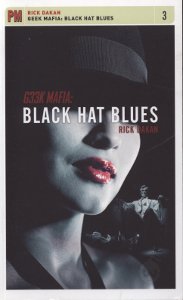 Geek Mafia: Black Hat Blues
Geek Mafia: Black Hat Blues
What do you call 1000 hackers assembled into one hotel for the weekend? A menace to society? Trouble waiting to happen? They call it a computer security conference, or really, a Hacker Con. A place for hackers, security experts, penetration testers, and tech geeks of all stripes to gather and discuss the latest hack, exploits, and gossip. For Paul, Chloe, and their Crew of con artist vigilantes, it’s the perfect hunting ground for their most ambitious plans yet.
After a year of undercover recruiting at hacker cons all over the country, Chloe and Paul have assembled a new Crew of elite hackers, driven anarchist activists, and seductive impersonators. Under the cover of one of the Washington DC’s biggest and most prestigious hacker events, they’re going up against power house lobbyists, black hat hackers, and even the U.S. Congress in order to take down their most challenging, and most deserving target yet. The stakes have never been higher for them, and who knows if their new recruits are up to the immense challenge of undermining “homeland security†for the greater good.
Inspired by years of author Rick Dakan’s research in the hacker community, Geek Mafia: Black Hat Blues, opens a new, self-contained chapter in the techno-thriller series.
PM Press – Overview
**********************************************************************************************************
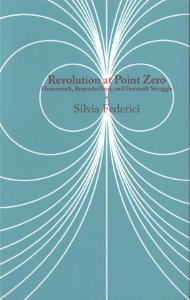 Revolution at Point Zero: Housework, Reproduction, and Feminist Struggle
Revolution at Point Zero: Housework, Reproduction, and Feminist Struggle
Written between 1974 and the present, Revolution at Point Zero collects forty years of research and theorizing on the nature of housework, social reproduction, and women’s struggles on this terrain—to escape it, to better its conditions, to reconstruct it in ways that provide an alternative to capitalist relations.
Indeed, as Federici reveals, behind the capitalist organization of work and the contradictions inherent in “alienated labor†is an explosive ground zero for revolutionary practice upon which are decided the daily realities of our collective reproduction.
Beginning with Federici’s organizational work in the Wages for Housework movement, the essays collected here unravel the power and politics of wide but related issues including the international restructuring of reproductive work and its effects on the sexual division of labor, the globalization of care work and sex work, the crisis of elder care, the development of affective labor, and the politics of the commons.
PM Press – Overview
**********************************************************************************************************
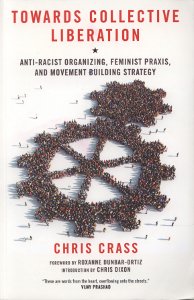 Towards Collective Liberation: Anti-Racist Organizing, Feminist Praxis, and Movement Building Strategy
Towards Collective Liberation: Anti-Racist Organizing, Feminist Praxis, and Movement Building Strategy
Towards Collective Liberation: Anti-Racist Organizing, Feminist Praxis, and Movement Building Strategy is for activists engaging with dynamic questions of how to create and support effective movements for visionary systemic change. Chris Crass’s collection of essays and interviews presents us with powerful lessons for transformative organizing through offering a firsthand look at the challenges and the opportunities of anti-racist work in white communities, feminist work with men, and bringing women of color feminism into the heart of social movements. Drawing on two decades of personal activist experience and case studies of anti-racist social justice organizations, Crass insightfully explores ways of transforming divisions of race, class, and gender into catalysts for powerful vision, strategy, and movement building in the United States today.
Over the last two decades, activists in the United States have been experimenting with new politics and organizational approaches that stem from a fusion of radical political traditions and liberation struggles. Drawing inspiration from women of color feminism, justice struggles in communities of color, anarchist and socialist movements, the broad upsurges of the 1960s and 70s, and social movements in the Global South, a new generation of activists has sought to understand the past while building a movement for today’s world. Towards Collective Liberation contributes to this project by examining two primary dynamic trends in these efforts: the anarchist movement of the 1990s and 2000s, through which tens of thousands of activists were introduced to radical politics, direct action organizing, democratic decision making, and the profound challenges of taking on systems of oppression, privilege, and power in society at large and in the movement itself; and white anti-racist organizing efforts from the 2000s to the present as part of a larger strategy to build broad-based, effective multiracial movements in the United States.
Crass’s collection begins with an overview of the anarchist tradition as it relates to contemporary activism and an in-depth look at Food Not Bombs, one of the leading anarchist groups in the revitalized radical Left in the 1990s. The second and third sections of the book combine stories and lessons from Crass’s experiences of working as an anti-racist and feminist organizer, combining insights from the Civil Rights Movement, women of color feminism, and anarchism to address questions of leadership, organization building, and revolutionary strategy. In section four, Crass discusses how contemporary organizations have responded to the need for white activists to lead anti-racist efforts in white communities and how these efforts have contributed to multiracial alliances in building a broad-based movement for collective liberation. Offering rich case studies of successful organizing, and grounded, thoughtful key lessons for movement building, Toward Collective Liberation is a must-read for anyone working for a better world.
PM Press – Overview
**********************************************************************************************************
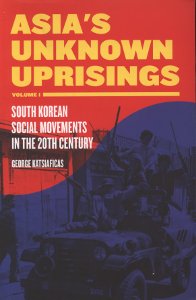 Asia’s Unknown Uprisings Volume 1: South Korean Social Movements in the 20th Century
Asia’s Unknown Uprisings Volume 1: South Korean Social Movements in the 20th Century
Using social movements as a prism to illuminate the oft-hidden history of 20th century Korea, this book provides detailed analysis of major uprisings that have patterned that country’s politics and society. From the 1894 Tonghak Uprising through the March 1, 1919, independence movement and anti-Japanese resistance, a direct line is traced to the popular opposition to U.S. division of Korea after World War Two. The overthrow of Syngman Rhee in 1960, resistance to Park Chung-hee, the 1980 Gwangju Uprising, as well as student, labor, and feminist movements are all recounted with attention to their economic and political contexts. South Korean opposition to neoliberalism is portrayed in detail, as is an analysis of neoliberalism’s rise and effects. With a central focus on the Gwangju Uprising (that ultimately proved decisive in South Korea’s democratization), the author uses Korean experiences as a baseboard to extrapolate into the possibilities of global social movements in the 21st century.
Previous English language sources have emphasized leaders—whether Korean, Japanese, or American. This book emphasizes grassroots crystallization of counter-elite dynamics and notes how the intelligence of ordinary people surpasses that of political and economic leaders holding the reins of power. It is the first volume in a two-part study that concludes by analyzing in rich detail uprisings in nine other places: the Philippines, Burma, Tibet, China, Taiwan, Bangladesh, Nepal, Thailand, and Indonesia. Richly illustrated, with tables, charts, graphs, index, and footnotes.
PM Press – Overview
**********************************************************************************************************
 Asia’s Unknown Uprisings Volume 2: People Power in the Philippines, Burma, Tibet, China, Taiwan, Bangladesh, Nepal, Thailand, and Indonesia, 1947—2009
Asia’s Unknown Uprisings Volume 2: People Power in the Philippines, Burma, Tibet, China, Taiwan, Bangladesh, Nepal, Thailand, and Indonesia, 1947—2009
Ten years in the making, this magisterial work—the second of a two-volume study—provides a unique perspective on uprisings in nine Asian nations in the past five decades. While the 2011 Arab Spring is well known, the wave of uprisings that swept Asia in the 1980s remain hardly visible. Through a critique of Samuel Huntington’s notion of a “Third Wave†of democratization, the author relates Asian uprisings to predecessors in 1968 and shows their subsequent influence on uprisings in Eastern Europe at the end of the 1980s. By empirically reconstructing the specific history of each Asian uprising, significant insight into major constituencies of change and the trajectories of these societies becomes visible.
This book provides detailed histories of uprisings in nine places—the Philippines, Burma, Tibet, China, Taiwan, Bangladesh, Nepal, Thailand, and Indonesia—as well as introductory and concluding chapters that place them in a global context and analyze them in light of major sociological theories. Profusely illustrated with photographs, tables, graphs, and charts, it is the definitive, and defining, work from the eminent participant-observer scholar of social movements.
PM Press – Overview
**********************************************************************************************************
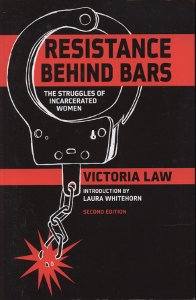 Resistance Behind Bars: The Struggles Of Incarcerated Women
Resistance Behind Bars: The Struggles Of Incarcerated Women
In 1974, women imprisoned at New York’s maximum-security prison at Bedford Hills staged what is known as the August Rebellion. Protesting the brutal beating of a fellow prisoner, the women fought off guards, holding seven of them hostage, and took over sections of the prison.
While many have heard of the 1971 Attica prison uprising, the August Rebellion remains relatively unknown even in activist circles. Resistance Behind Bars is determined to challenge and change such oversights. As it examines daily struggles against appalling prison conditions and injustices, Resistance documents both collective organizing and individual resistance among women incarcerated in the U.S. Emphasizing women’s agency in resisting the conditions of their confinement through forming peer education groups, clandestinely arranging ways for children to visit mothers in distant prisons and raising public awareness about their lives, Resistance seeks to spark further discussion and research into the lives of incarcerated women and galvanize much-needed outside support for their struggles.
This updated and revised edition of the 2009 PASS Award winning book includes a new chapter about transgender, transsexual, intersex, and gender-variant people in prison.
PM Press – Overview
**********************************************************************************************************
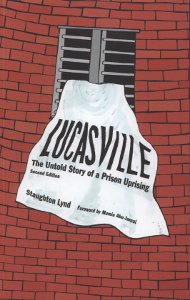 Lucasville: The Untold Story of a Prison Uprising
Lucasville: The Untold Story of a Prison Uprising
Lucasville tells the story of one of the longest prison uprisings in U.S. history. At the maximum-security Southern Ohio Correctional Facility in Lucasville, Ohio, prisoners seized a major area of the prison on Easter Sunday, 1993. More than 400 prisoners held L block for eleven days. Nine prisoners alleged to have been informants, or „snitches,“ and one hostage correctional officer, were murdered. There was a negotiated surrender. Thereafter, almost wholly on the basis of testimony by prisoner informants who received deals in exchange, five spokespersons or leaders were tried and sentenced to death, and more than a dozen others received long sentences.
Lucasville examines the causes of the disturbance, what happened during the eleven days, and the fairness of the trials. Particular emphasis is placed on the interracial character of the action, as evidenced in the slogans that were found painted on walls after the surrender: „Black and White Together,“ „Convict Unity,“ and „Convict Race.“
An eloquent Foreword by Mumia Abu-Jamal underlines these themes. He states, as does the book, that the men later sentenced to death „sought to minimize violence, and indeed, according to substantial evidence, saved the lives of several men, prisoner and guard alike.“ Of the five men, three black and two white, who were sentenced to death, Mumia declares, „They rose above their status as prisoners, and became, for a few days in April 1993, what rebels in Attica had demanded a generation before them: men. As such, they did not betray each other; they did not dishonor each other; they reached beyond their prison ‚tribes‘ to reach commonality.“
PM Press – Overview
**********************************************************************************************************
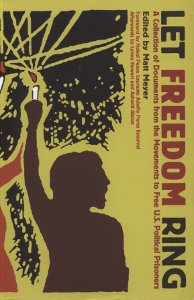 Let Freedom Ring: A Collection of Documents from the Movements to Free U.S. Political Prisoners
Let Freedom Ring: A Collection of Documents from the Movements to Free U.S. Political Prisoners
Let Freedom Ring presents a two-decade sweep of essays, analyses, histories, interviews, resolutions, People’s Tribunal verdicts, and poems by and about the scores of U.S. political prisoners and the campaigns to safeguard their rights and secure their freedom. In addition to an extensive section on the campaign to free death-row journalist Mumia Abu-Jamal, represented here are the radical movements that have most challenged the U.S. empire from within: Black Panthers and other Black liberation fighters, Puerto Rican independentistas, Indigenous sovereignty activists, white anti-imperialists, environmental and animal rights militants, Arab and Muslim activists, Iraq war resisters, and others. Contributors in and out of prison detail the repressive methods—from long-term isolation to sensory deprivation to politically inspired parole denial—used to attack these freedom fighters, some still caged after 30+ years. This invaluable resource guide offers inspiring stories of the creative, and sometimes winning, strategies to bring them home.
Contributors include: Mumia Abu-Jamal, Dan Berger, Dhoruba Bin-Wahad, Bob Lederer, Terry Bisson, Laura Whitehorn, Safiya Bukhari, The San Francisco 8, Angela Davis, Bo Brown, Bill Dunne, Jalil Muntaqim, Susie Day, Luis Nieves Falcón, Ninotchka Rosca, Meg Starr, Assata Shakur, Jill Soffiyah Elijah, Jan Susler, Chrystos, Jose Lopez, Leonard Peltier, Marilyn Buck, Oscar López Rivera, Sundiata Acoli, Ramona Africa, Linda Thurston, Desmond Tutu, Mairead Corrigan Maguire and many more.
PM Press – Overview
**********************************************************************************************************
 Outrage: An Anarchist Memoir of the Penal Colony
Outrage: An Anarchist Memoir of the Penal Colony
“Theft exists only through the exploitation of man by man…when Society refuses you the right to exist, you must take it…the policeman arrested me in the name of the Law, I struck him in the name of Liberty.â€
In 1887, Clément Duval joined the tens of thousands of convicts sent to the “dry guillotine†of the French penal colonies. Few survived and fewer were able to tell the stories of their life in that hell. Duval spent fourteen years doing hard labor—espousing the values of anarchism and demonstrating the ideals by being a living example the entire time—before making his daring escape and arriving in New York City, welcomed by the Italian and French anarchists there.
This is much more than an historical document about the anarchist movement and the penal colony. It is a remarkable story of survival by one man’s self-determination, energy, courage, loyalty, and hope. It was thanks to being true and faithful to his ideals that Duval survived life in this hell. Unlike the well-known prisoner Papillon, who arrived and dramatically escaped soon after Duval, he encouraged his fellow prisoners to practice mutual aid, through their deeds and not just their words. It is a call to action for mindful, conscious people to fight for their rights to the very end, to never give up or give in.
More than just a story of a life or a testament of ideals, here is a monument to the human spirit and a war cry for freedom and justice.
PM Press – Overview
**********************************************************************************************************
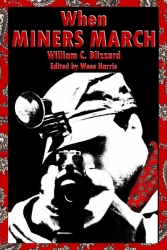 When Miners March
When Miners March
In the first half of the 20th century, strikes and Union battles, murders and frame-ups, were common in every industrial center in the U.S. But none of these episodes compared in scope to the West Virginia Mine Wars.
The uprisings of coal miners that defined the Mine Wars of the 1920’s were a direct result of the Draconian rule of the coal companies. The climax was the Battle of Blair Mountain, the largest open and armed rebellion in U.S. history. The Battle, and Union leader Bill Blizzard’s quest for justice, was only quelled when the U.S. Army brought guns, poison gas and aerial bombers to stop the 10,000 bandanna-clad miners who formed the spontaneous “Red Neck Army.â€
Over half a century ago, William C. Blizzard wrote the definitive insider’s history of the Mine Wars and the resulting trial for treason of his father, the fearless leader of the Red Neck Army. Events dramatized in John Sayles film Matewan, and fictionalized in Denise Giardina’s stirring novel Storming Heaven, are here recounted as they occurred. This is a people’s history, complete with previously unpublished family photos and documents. If it brawls a little, and brags a little, and is angry more than a little, well, the people in this book were that way.
PM Press – Overview



